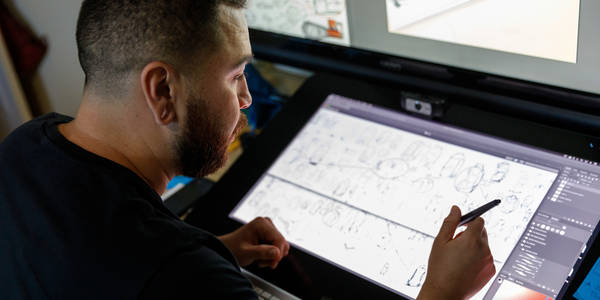podcast / president / graphic-design
October 23, 2019
Produced by: Christine Spines
Change Lab Podcast Episode 29
Saki Mafundikwa and Sadie Red Wing on Decolonizing Design
Sadie Red Wing and Saki Mafundikwa grew up a world and two generations apart. Sadie was born into the Lakota tribe and also considers herself a citizen of the Spirt Lake Nation of Fort Totten, South Dakota—two longstanding American indigenous communities. Saki, on the other hand, didn’t set foot in the United States until he left his native Zimbabwe at age 24 in 1979, almost twenty years before Sadie was born.
I’m seeing the debate turning to decolonization, which is the breaking down of the boundaries and the walls around design. It belongs to everybody.
Saki Mafundikwa

Despite their different points of origin, their approach to their chosen profession is strikingly similar. They’re both pioneering designers who focus their practices on giving voice and context to underrepresented communities whose rich visual languages have often been subsumed or ignored by mainstream design’s bias toward Western modes of communication.



Their means of achieving these shared goals, however, is uniquely their own. Sadie set out to restore “visual sovereignty” through her series of irreverent lectures highlighting the importance of removing stereotypes from indigenous visual languages. Saki has deployed design as a means to empower and increase representation through his groundbreaking book, African Alphabets, and by opening the Zimbabwean Institute of Vigital Arts in Harare. (Vigital is his made -up word to describe the intersection of visual and digital).
Saki and Sadie joined forces for the first time in a joint workshop, hosted by ArtCenter's Humanities and Sciences department, entitled: Finding Our Way Home. The four-hour workshop created a space for students of all backgrounds to visually identify themselves, exhibit pride in representation and come away inspired to allow their heritage to inform their design work. We’ve also included a first-hand perspective on the workshop from participant, Amina Maya, a photographer and designer who works as a Junior Creative Director at Black Girl in Om, and Founder of Naturaliste Apothecary.
This thought-provoking episode of Change Lab explores some of the most vital issues facing both design and academia through the lens of Sadie and Saki’s unique but parallel journeys toward better representing their own cultures in their work and encouraging diversity and inclusivity throughout the arts.







